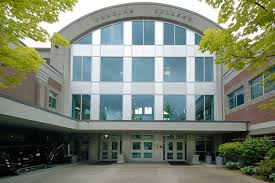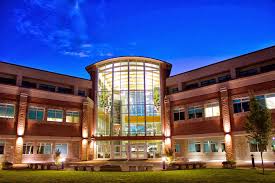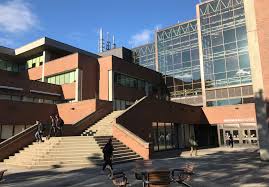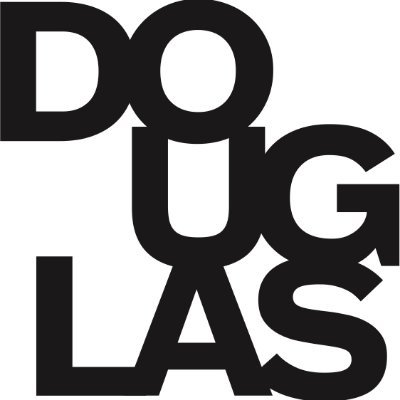Douglas College

Douglas College
Location: New Westminster, Coquitlam, British Columbia, Canada
Foundation Year: 1970
Type: Public
Tuition Fees: 3,100 CAD per year
Douglas College (DC) is the largest public college in British Columbia, more than 25,000 thousand students choose it annually. 4,000 of them come from different countries of the world, making the academic atmosphere dynamic and diverse. The institution began its history in 1970 and was named after the former governor of the province, Sir James Douglas.
In 2020, Douglas College celebrated its 50th anniversary and revealed its new Coat of Arms, the first one to be completely designed by an Indigenous artist in Canada's history.
Douglas College is known for its high quality of education and low tuition fees among the institutions of Metro Vancouver. DC students successfully transfer to SFU and UBC, as well as universities across Canada. Maximum 35 students per class guarantee high interaction with professors. Through work placements, field schools, field trips, and labs students get real work experience.

Douglas College offers 13 Bachelor’s Degrees in Business, Health Care, Human Services, Sciences, Liberal Arts and Humanities. All of the degrees are applied, students get hands-on learning in real workplaces to complement their classroom learning. This approach gives lots of benefits as employers, who want employees with experience, often hire DC students as soon as they graduate. The courses offered are Accounting, Child and Youth Care, Applied Criminology, Management, Financial Services, Nursing, Performing Arts, Physical Education and Coaching, Psychiatric Nursing, Psychology and Applied Psychology, Social Work, and Therapeutic Recreation.
Douglas College University-transfer programs are very popular among the applicants. Students take the first two years (60 credits) with DC and then transfer to UBC, SFU, UVic, or another top school in British Columbia or across Canada to complete their Bachelor’s degree. They graduate with the same credential as those who started at university, but with a few advantages: small class sizes, hands-on learning and experience through work placements, overseas field schools, labs, field trips, and on the stage (for performing arts), low tuition fees during the first two years by starting the degree at Douglas instead of at a research university.
Douglas College Associate Degrees are two-year programs that concentrate on a particular area of study. Carefully selected courses that correspond to the future university program guarantee 60 credits that transfer to that university, as well as all of the advantages of any University-transfer program. Associate degrees in Arts and Sciences are available.
Douglas College Co-op programs alternate semesters of classroom studies with paid, full-time work, giving students hands-on experience that makes them job-ready. Programs that offer a Co-op plan are Accounting, Accounting, and Finance, Computer and Information Systems, Computing Studies and Information Systems, Finance, Financial Services, Management, Physical Education, and Coaching. Veterinary Technology
DC Career programs help students to enter a new job or upgrade to a higher position. These are 60-credit programs that can be offered on a part-time basis. The College offers 40 programs in Technology, Community and Human Services, Health Care, Applied and Performing Arts, Business and Communications that can vary from 1-year certificates to 4-year degrees.
The Continuing Education department also has short-term career training to offer. For applicants who already have a degree, post-degree diploma programs are also an option to consider. Post-degree diplomas take one year and 30 credits to accomplish, the programs offered are Accounting, Business Law, Finance, Global Banking and Economics, Hospitality, Information and Communication Technology, International Business Management, Marketing, Professional Communication, Project Management, Sales.

Post-baccalaureate diplomas take two years and 60 credits to graduate and focus on Accounting, Computer and Information Systems, Finance, Health Information Management, Hospitality Services Management, and International Supply Chain Management. The duration of Graduate diploma programs vary from one to two years and 30 to 60 credits and cover the areas of Mathematics and Science Teaching, Physical Education, Psychosocial Rehabilitation.
Douglas College offers special English upgrading and Mathematics upgrading programs. They provide a variety of courses designed to prepare students for entry to college-level courses and programs. The English Upgrading program offers courses in reading, writing, learning, and study skills and the Mathematics Upgrading program develops arithmetic, algebra, and logic. Levels range from basic to college preparation, and applicants can take upgrading courses while taking some University Transfer courses. Field Schools, Exchanges, Summer Programs, and International Co-ops are available at DC.
Admission requirements include high school graduation and minimum 17 years of age by the first day of class; and a minimum overall grade average of “C” or equivalent in the final year of high school; and a minimum final grade of “C” or equivalent in Grade 11 Mathematics for most programs. The English language requirements include proof of British Columbia high school English 12: minimum grade C, or TOEFL: iBT minimum score 83, or IELTS (academic module): minimum overall score 6.5 or successful completion of courses at Douglas College.
All the DC campuses are conveniently located and can be reached in 30 minutes or less by SkyTrain from most of Metro Vancouver. International students at Douglas College can choose Homestay Programs offered by homestay placement service First Choice International Placement. Students interested in staying at a residence, are recommended to contact Global Education City.
Tuition Fees vary depending on a chosen program and are around 3,100 CAD per year for International students. Douglas College offers more than 250 scholarships, bursaries, and awards annually, some are based on financial need, others depend on grades, programs, or community involvement.
Regards,
International Experience Club

